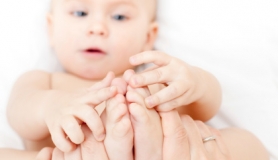I spend my nights arranging myself around my baby, waking to feed her and tucking her into my arms to comfort her when she’s teething. There’s plenty of space in the bed because my husband spends most nights sharing the bottom bunk with our four-year old, who likes his own bedroom but gets lonely in the dark! It’s exhausting but it works for us and, as adults, we make allowances for the tiredness and stresses we suffer. I think the person it is hardest upon is our eldest daughter who, at eleven, doesn’t want to bedshare and is developing her sense of independence but is still very much in need of a connection with her parents.
When our children are small, it’s possible to spend almost all day in physical contact with them – snuggly storytimes, comforting cuddles, breastfeeding and carrying our children are all ways of keeping them close. As they grow, it is easy to see how these physical intimacies are gradually eroded from our days until saying goodbye or goodnight may become the only time we hug or kiss our older children. Of course, many of us work hard to prevent our bond from diminishing, and there are many ways to promote closeness as our children grow.
Holding On
Hold Onto Your Kids, by Gordon Neufeld and Gabor Maté, is based on the idea that our children are primarily attached to us, their parents, and other adults as their role models and that the attachment bond we share with them forms the basis of the self-esteem, confidence and independence they will develop as they mature. The authors suggest that in Western society since the end of the Second World War, we have seen a shift whereby children, as they grow older, have begun to turn away from these primary attachments and instead begin to attach to their friends, becoming “peer-attached” instead of adult-attached. Since our culture has allowed this to happen, it is now seen as normal within our society, with many parents struggling to maintain connections with their disinterested, disaffected teenage children who seem to have simply stopped caring what they think.
Children with low self esteem are more likely to become disaffected and parents often try to remedy this by encouraging their children’s friendships with their peers. According to Neufeld, this is causing further problems as our children begin to see their friends as their role models and take on their values and behaviours instead of ours. The impact of this cultural shift can be seen in the media and throughout our daily lives. Campaigns to ban “hoodies” and media coverage of increasing gang violence in our cities demonstrate that these social issues are often blamed on teenagers. But perhaps the problem runs deeper and these are symptoms of a society in which familial bonds are weakened by expectations and parents are forced to stop parenting their children long before either are really ready.
Nurturing attachment
So how can we prevent our children from becoming detached from us? And how can we re-claim them if we can already see this happening?
Neufeld suggests that the lack of physical closeness in our children’s lives as they grow up leads to “voids” of attachment and intimacy that increase the likelihood of teenagers seeking positive affirmation through their peers rather than their families. In reality, this can create dependencies on others who are at the same stage, pushing children into dependent friendships and relationships that they are not ready for. Time to re-connect is vital to our growing children – a weekend away with a parent can build bridges and develop trust and intimacy that may have been compromised as a child has grown older. Setting aside a specific time for strengthening this connection allows both the child and the parent to re-align themselves and affirm their mutual bond.
Re-affirming your bond
Hold Onto Your Kids highlights the importance of “collecting” a child before any interaction, with a smile, eye contact or making some other form of connection. This is something we do automatically with babies, moving in to smile and coo. As children grow, however, we seem to lose this skill and instead begin our interactions with requests, information or advice. The importance of frequently re-affirming our bond and reminding the child of the connection we share cannot be underestimated and, in the case of making a request, is much more likely to invite a positive response!
It seems obvious that part of the role of a parent is to prepare our children for independence. It is quite revolutionary, however, to suggest that this may be best achieved by encouraging dependence. Logically, though, allowing our children to rely on us to meet their every need and to pick up the pieces for them can only build their confidence and self esteem in ways that being forced to strike out alone cannot. The parent/child relationship is intended by nature to be one in which the parent is in control and the dependent child feels safe and protected as they grow towards being able to make their own decisions and judgements. Although a child may master a necessary skill through being left to his or her own devices, the resultant skill will stem from a place of fear, abandonment and confusion. Skills that come from stability, security and comfort can be seen as much more holistic and enduring. Encouraging our children to accept us as role models and caretakers can allow them to totally relax and explore their world without stress or anxiety and we can help them to rely on us by building in rituals which highlight ways in which we can assist them throughout their lives.
“Time to re-connect is vital to our growing children – a weekend away with a parent can build bridges and develop trust and intimacy”
Physical Closeness
Massage is a great way to keep a physical connection between parents and children of any age. At a time when older children and teenagers may be experiencing stresses and anxieties for the first time, whether they are taking exams, moving to new schools or dealing with puberty, the offer of a massage can not only relieve physical stresses but can also reinforce the parent’s absolute acceptance of them as they are. We can build time into our routines for this, even a ten minute massage at bedtime once a week can become important in showing our children that they matter to us and that we are always prepared to make time to nourish our relationship with them.
Wrestling is a technique often used with younger children to teach them about respect and power in a gentle, connective way. This can be extended to older children – although Lawrence Cohen, author of Playful Parenting, suggests continually checking the suitability of the “rules” and making adjustments where needed. Older siblings can also be taught to wrestle with little ones, having a positive impact on both parties and providing more touch connections in the lives of older children.
Investing time
Of course, we can encourage physical comfortableness with our children by simply being relaxed around them and adapting our displays of affection to their age. While sitting on a parent’s lap for an hour is less likely to happen when children are older, throwing and catching a ball is a connective activity that also speaks volumes to the child about their value to their parents. Time invested and emotional closeness really do go hand in hand. Many children, especially boys, prefer to discuss subjects they may find difficult or embarrassing when they are otherwise engaged – standing side by side while washing up or chatting while playing a ball game may encourage them to open up with less fear of a negative reaction.
Sharing long conversations may not always be what our children want, but I have found that a shared diary is a useful tool for keeping communication channels open. In our house, this has taken the form of a beautiful, enticing notebook which can be left beside the bed of parent or child containing discussions of our current difficulties or a simple ‘how was your day?’ or ‘what would you like for dinner?’ This technique reinforces the relationship and serves as a reminder of the caring bond that exists regardless of day to day occurrences that may otherwise challenge a child’s belief in unconditional love. When a stressful day has ended badly, or a busy week has left little time for checking-in, a few words can show a child that a supportive and loving parent is making an effort to maintain the connection rather than allowing the relationship to succumb to external pressures.
Reading together
Reading together is an activity that parents and children can share throughout childhood and reading books with older children and teens can allow you to broach new subjects together and even work through issues which might otherwise be challenging to bring into conversation. The wealth of literature for older children is impressive and new authors in this field are creating inspiring and thought-provoking material all the time. We have found many authors who encourage all sorts of discussions about parenting, lifestyle choices, travel, schooling and even food!
Special evenings shared
Film or game nights are a great way to spend time connecting with older children while younger siblings are asleep and this special time with parents seems invaluable to them as they grow up. Watching a good film, snuggled on the sofa with popcorn, or sitting together around a board game can be wonderful ways to connect with children who often lead busier lives than we do! There are some excellent websites that recommend specific types of films for different purposes: A Mighty Girl, for example, contains lists of films, books and music with positive, empowering female role models to counteract the princess-waiting-to-be-rescued image that is so prevalent in our culture.
According to Neufeld, preserving our connection with our children should be our priority at all times, whether we are sharing a happy moment or trying to impose discipline. Even when confronted with challenging behaviour, he suggests addressing our attachment first as this is the way in which we earn our children’s respect, making them more likely to value our ideals and behave in ways we find acceptable. In this light, the key to maintaining a close relationship is to stay “in touch” with our children for as long as they need us, until they are mature enough to become fully independent adults themselves.
Claire is a Doula and writer. She lives in Devon with her husband and three children and co-runs Exeter Homebirth Support group
What to read
- Hold Onto Your Kids, Why Parents Need to Matter More Than Peers, Gordon Neufeld and Gabor Maté
- Playful Parenting Lawrence J. Cohen
- Healing Touch for Children: Massage, Acupressure and Reflexology Routines for Children Aged 4 -12 Mary Atkinson
- The Book of New Family Traditions Meg Cox
Want to know more?
amightygirl.com – great resource for parents with daughters as this site shares the world’s largest collection of books and movies for smart, confident girls.







